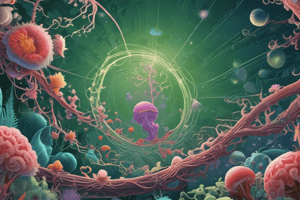Podcast
Questions and Answers
What is biology?
What is biology?
- The scientific study of life (correct)
- The study of rocks and minerals
- The study of human behavior
- The study of weather patterns
What unifying themes tie biology together?
What unifying themes tie biology together?
- Rocks, minerals, and weather patterns
- Physics, chemistry, and mathematics
- Human behavior and societal structures
- Cells, hereditary information, evolution, and energy processing (correct)
At what levels can biologists study life?
At what levels can biologists study life?
- From political science to economics
- From literature to art history
- From molecular biology to the evolution of populations (correct)
- From astronomy to geology
What is the diversity of life on Earth?
What is the diversity of life on Earth?
What is the importance of energy processing to life?
What is the importance of energy processing to life?
What is the period of events before the invention of writing systems considered as?
What is the period of events before the invention of writing systems considered as?
What sources do historians use to seek knowledge of the past?
What sources do historians use to seek knowledge of the past?
What is the key difference between history and myth?
What is the key difference between history and myth?
What does history as an academic discipline use to describe past events?
What does history as an academic discipline use to describe past events?
What do historians debate regarding past events?
What do historians debate regarding past events?
Flashcards are hidden until you start studying
Study Notes
Biology Overview
- Biology is the science of life, encompassing the study of living organisms and their interactions with the environment.
Unifying Themes in Biology
- Evolution: Central to understanding the diversity and adaptation of life.
- Structure and Function: Biological structures are intricately linked to their roles and functions in organisms.
- Information Flow: The transmission of genetic information guides organism development and functioning.
- Energy and Matter: Life processes depend on energy transfer and matter cycling through ecosystems.
- Systems: Biological systems exhibit complex interactions among their components.
Levels of Biological Study
- Molecular Level: Focus on DNA, proteins, and cellular processes.
- Cellular Level: Study of cell structure and function.
- Organismal Level: Examination of individual organisms from various perspectives.
- Population Level: Analysis of groups of the same species in particular environments.
- Ecosystem Level: Interaction among living organisms and their physical environment.
- Biodiversity Level: Study of variety within and among living species.
Diversity of Life on Earth
- Millions of known species contribute to Earth's biodiversity, ranging from microorganisms to complex multicellular organisms.
- Ecosystems are dynamic and consist of unique organisms adapted to their environments.
Importance of Energy Processing
- Energy processing is essential to all living organisms as it drives metabolic activities, growth, reproduction, and ecological balance.
- Organisms convert energy from various sources, like sunlight or organic matter, to sustain life.
Pre-Writing Historical Period
- The period before writing systems is termed Prehistory. It encompasses early human life and societal development without recorded history.
Sources Historians Use
- Primary Sources: Original documents, artifacts, or eyewitness accounts.
- Secondary Sources: Analyses, interpretations, or summaries of primary sources.
- Oral Histories: Verbal accounts that preserve information passed through generations.
Difference Between History and Myth
- History relies on factual evidence and documentation, while myth involves traditional stories often rooted in cultural beliefs, lacking empirical evidence.
History as an Academic Discipline
- History employs critical analysis and methodology to reconstruct and explain past events based on available evidence.
- Historians craft narratives that encompass social, political, economic, and cultural aspects of the past.
Historians' Debates on Past Events
- Historians often debate the interpretations, significance, and accuracy of historical events, leading to varying conclusions based on differing evidence or perspectives.
Studying That Suits You
Use AI to generate personalized quizzes and flashcards to suit your learning preferences.




